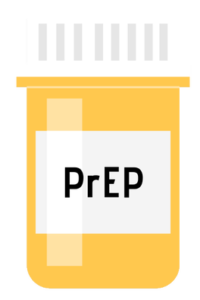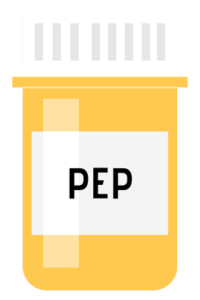What is PrEP?

Pre-exposure prophylaxis or PrEP is a daily medication that can help reduce the risk of getting HIV-1 through sex. PrEP does not prevent other sexually transmitted infections (STIs) or pregnancy and should be used in conjunction with other safer sex practices. PrEP is a preventative medication and will not prevent HIV-1 if exposure has already occured.
Is PrEP right for me?
If you are someone who is considered to be at a higher risk for HIV then PrEP is worth consideration. PrEP is recommended for gay and bisexual men as well as transgender people who have receptive anal or vaginal sex. PrEP may be a good option if you are HIV-negative and in a relationship with someone who is HIV-positive (also known as a mixed status or serodiscordant relationship.)
Things to know:
- This is a daily medication and missing a dose lowers its effectiveness.
- PrEP does not prevent other sexually transmitted infections (STIs) or pregnancy. Please continue your use of safer sex practices to reduce these other risks.
- Even if you are on PrEP, you should still regularly get tested for HIV and other STIs.
What is PEP?

Though they may sound similar, PEP (post-exposure prophylaxis) and PrEP (pre-exposure prophylaxis) actually serve two different purposes. As stated above, PrEP works to prevent HIV-1 but PEP is meant to work after the fact. PEP must be prescribed within 72-hours of exposure for it to be effective. PEP is not just one pill. PEP is a regimen and has to be taken 1-2 times per day for 28 days. The effectiveness is greatly reduced if you do not follow this regimen.
Some examples of when PEP may be necessary:
- You had sex with someone who may be HIV positive and did not use a condom or if the condom broke.
- You were sexually assaulted.
- You shared needles or works (cotton, cookers, water, etc.) with someone who may be HIV positive.
Where do I go if I need PEP?
PEP can only be prescribed within 72-hours of exposure so you need to talk to a healthcare provider immediately if you think you have been exposed. PEP can be prescribed by your primary care doctor and your local Planned Parenthood but if you cannot get into these places within the 72-hour window, then you need to go to the emergency room.
What if I don't have insurance?
Insurance can be a barrier to care for a lot of people. Luckily, there are assistance programs to help cover the cost of PEP as well as the co-pay.

